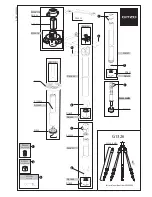
Network Deployment Guide for NovoConnect
V1.0 Page
1
of
18
Network Deployment Guide for NovoConnect Devices
NovoConnect is a wireless presentation and collaboration system designed to support highly
interactive and collaborative meetings or classroom learning activities. Meeting participants,
instructors, teachers and students can interact and share digital content via their PCs, tablets,
Chromebooks and smartphones — a true BYOD device. These include the NovoCast, NovoPro,
and NovoEnterprise. For simplicity’s sake, the diagrams and examples shown are for the NovoPro
device.
To fully take advantage of NovoConnect’s capabilities, it should be properly deployed in a school
or a corporate network. Some aspects should be carefully considered and planned, for example,
Wi-Fi interference and channel selection, intranet firewall, Bonjour protocol support across
different subnets/VLANs, Quality of Service and device management. In this whitepaper, we are
going to illustrate these points one by one to facilitate a successful NovoConnect deployment in
your network.
1.
Network Connection
NovoConnect has three network connection types, Ethernet, Wi-Fi Client, and Wi-Fi Hotspot.
A)
Ethernet
– NovoConnect can be plugged into your Ethernet via its RJ45 port. Namely,
you can connect NovoConnect to your organization’s backbone network.
It is
recommended to use an Ethernet connection (when possible) since it gives you better
robustness and higher performance.
B)
Wi-Fi
– NovoConnect’s built-in 802.11ac Wi-Fi operates at dual bands (2.4/5GHz).
With its 2T2R antenna, it can achieve a maximum bandwidth of 300Mbps
1
(NovoCast
currently only support 2.4GHz and has a 1T1R antenna).
This high-performance Wi-Fi
module can operate in two modes.
a)
Client Mode
– NovoConnect can be connected to your organization’s Wi-Fi
network via its built-in Wi-Fi module.
b)
Hotspot Mode
– NovoConnect can creates its own Wi-Fi network, allowing
users to connect their mobile devices to this ad hoc network.
The following table summarizes their feature differences and typical usage.
1
300Mbps is the maximum value while the actual bandwidth may vary depending on operating environment.


































